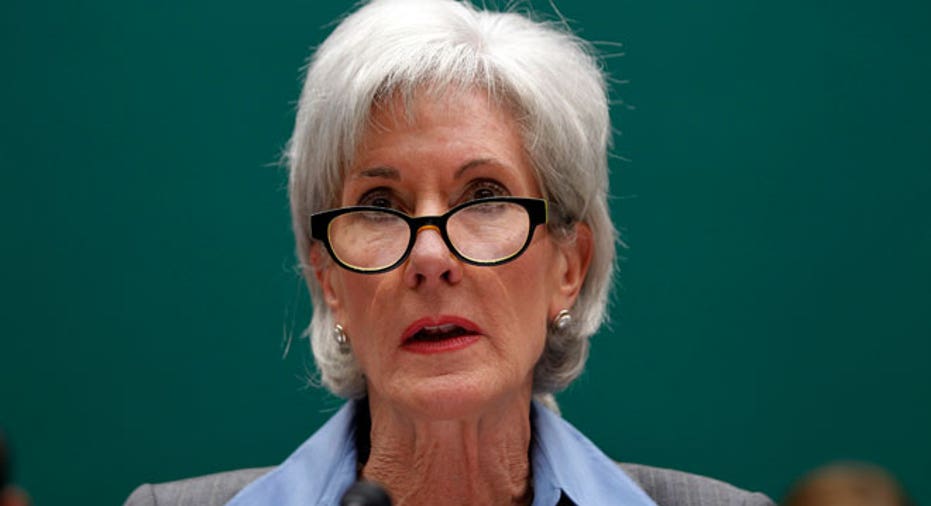Sebelius on Rocky Rollout of Health Exchanges: I'm Responsible

Five weeks into the Affordable Care Act’s open enrollment season, Secretary of Health and Human Services Kathleen Sebelius apologized for the glitches that have plagued the insurance registration site and have prevented many consumers from signing up for coverage.
“I am as frustrated and angry as anyone with the flawed launch of healthcare.gov. So let me say directly to these Americans: you deserve better. I apologize. I'm accountable to you for fixing these problems and I'm committed to earning your confidence back by fixing the site.”
The secretary admitted the rollout has been “a miserably frustrating experience.” The hearings come on the heels of HealthCare.gov experiencing outages Tuesday night following previous outages over the weekend and throughout its launch on Oct.1. She reiterated the White House's pledge to have the website working by the end of November. "We're committed that the vast majority of users will be able to review their options, shop for plans and enroll in coverage without the problems way too many have being experiencing."
Sebelius told lawmakers the government has spent about $118 million on the website itself, and about $56 million has been expended on other IT to support the web.
Sebelius said the website is improving every day and that 700,000 applications have been submitted to the federal and state marketplaces as the website has gotten more than 20 million unique visits. The government hired private contractors to build the site, but the former governor of Kansas said a “subset of those contractors for Healthcare.gov have not met expectations.” She said the site has already been updated several times to fix bugs and stabilize service.
On Tuesday, Marilyn Tavenner, administrator of the Centers for Medicare & Medicaid Services, was in the hot seat in front of the House Committee on Ways and Means and also apologized for the botched rollout but said the website was fixable. “This initial experience has not lived up to our expectations," she said in her testimony.
The rollout of the president’s signature legislation has been rocky; not only has the website prevented some Americans to sign up for coverage, but news reports claim the administration knew about the website’s potential problems and that many Americans were going to lose their current coverage. Calls for the secretary to step down have been growing over the last couple of weeks.
Fred Upton, (R-Mich.), chairman of the House Energy and Commerce Committee, asked Sebelius about the president's repeated promise that people who liked their current coverage would be able to keep it under the reform -- a pledge that is turning out not to be true for thousands of Americans across the country. "Despite the president's word, HHS helped promulgate a new regulation, that in your own review, showed that it effectively could deny perhaps as many as more than 50%, maybe even higher, of those holding individual policies the right to renew their own insurance plan."
Sebelius said there has been no change to the law's requirements and that the president has kept his promise. "The regulation involving grandfathered plans, which applied to both the employer market and the individual market, indicated that if a plan that was in effect in March of 2010 stayed in effect without unduly burdening the consumer with reducing benefits and adding on huge costs, that plan would stay in effect and never have to comply with any of the regulations of the Affordable Care Act. That's what the grandfather clause said. The individual market which affects about 12 million Americans, about 5% of the market, people move in and out, they often have coverage for less than a year. A third of them have coverage for about six months, and if a plan was in place of March of 2010 and again, did not impose additional burdens on the consumer, they still have it."
Democrats on the committee also pointed out that canceled plans are going to be replaced with ones offering better coverage. "The bottom line is that people with good coverage like Medicare, Medicaid, employer coverage can keep that," said Rep. Henry Waxman, (D-Calif.)."If an insurance company sold you a new modified health insurance policy after the date of the enactment that does not meet the law's standards, then those people will be able to go into the exchange and buy a real solid health insurance plan that won't discriminate against them or anybody else. I think that's a good result."
Rep. Joe Barton, (R-Texas), has introduced legislation that would make enrollment voluntary for the first year because of the all the problems with HealthCare.gov, and asked Sebelius if she supports the delay.
"No sir," she responded.
Also on Wednesday, President Obama heads to Boston to deliver remarks on the importance of health-care reform and provide an update on the steps being taken to fix the website. Massachusetts passed bipartisan health care law in 2006 and served as a model in drafting the Affordable Care Act.



















